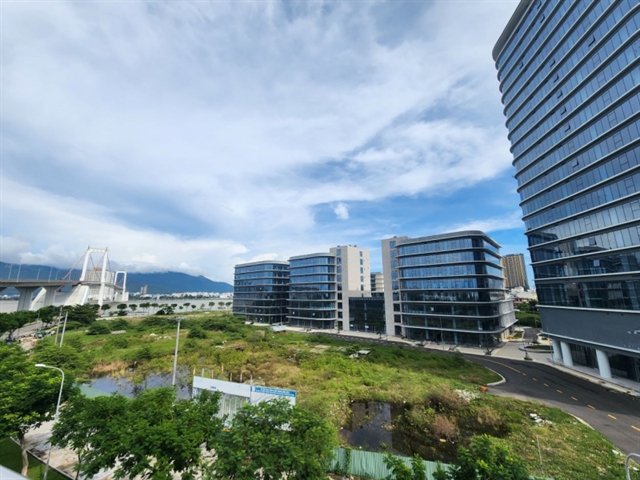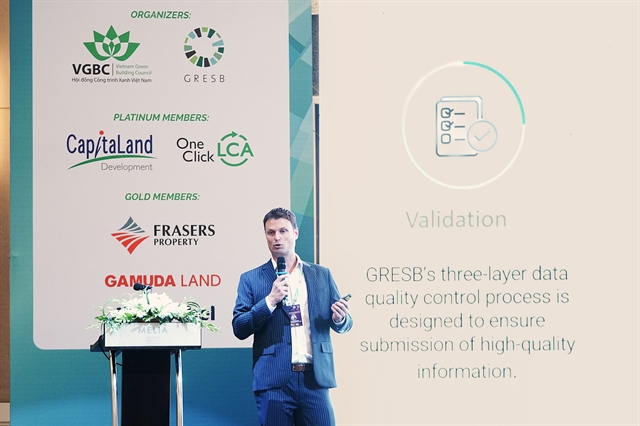 Talking Shop
Talking Shop


|
| Trey Archer, GRESB's Director of Business Development for Asia. — VNS Photo |
As global investors prioritise sustainability, environmental, social and governance (ESG) models are becoming a must-have for real estate. Việt Nam is at a turning point, poised to change ESG from a buzzword into a competitive edge.
Việt Nam News reporter Vũ Hoa spoke with Trey Archer, director of Business Development for Asia at the Global Real Estate Sustainability Benchmark (GRESB), an organisation that provides a widely recognised ESG benchmark for property and infrastructure investments, about why sustainability standards are becoming essential in real estate and how Việt Nam can accelerate their adoption.
What makes environmental, social and governance (ESG) standards the new 'financial passport' for real estate, especially as economies recover and global capital markets tighten their sustainability criteria?
ESG is becoming essential, especially in today’s volatile market environment, because it helps investors manage risk. In uncertain conditions, investors are increasingly looking to de-risk their portfolios, and one of the most effective ways to do that is by investing in sustainable assets. As I mentioned in my presentation, tools like GRESB and other sustainability rating systems offer transparency, allowing investors to clearly understand what they are investing in. These tools help ensure assets are energy efficient, climate resilient and meet other important criteria that not only safeguard long-term value but also deliver strong returns.
There is also a significant reputational risk involved. Investors want to be associated with stable, responsible companies. If a company is found to be involved in unethical practices – such as forced labour, for example – it reflects poorly on its investors. Given today’s tight capital markets and increasing awareness in the real estate sector, ESG has become even more critical. It enables investors to align their portfolios with sustainable, trustworthy and future-ready assets.
What is the biggest barrier to creating and adopting an ESG framework for real estate in Việt Nam?
I believe the main barrier is a lack of awareness. As we saw in the chart presented by CBRE, ESG awareness and adoption in Việt Nam is currently at around just 19 per cent. Many in the market still don’t fully understand the financial benefits of ESG. However, we’ve seen this play out in other countries.
When I first started working with GRESB in India four years ago, we had fewer than 10 participants. Today, that number is around 60. That growth came largely from focused education and outreach, helping the market understand how ESG translates into real financial value. We’re still seeing strong growth in India today.
In that sense, I see Việt Nam and other Southeast Asian markets as being where India was a few years ago – early in the journey. But with the right support, education and engagement, these markets can start to adopt and implement ESG strategies and enjoy the long-term benefits. So even though adoption is currently low, the momentum is clearly heading in the right direction.
How can ESG become a real competitive advantage, not just a checklist?
The key is simply to start. One common barrier is that many companies are overly focused on their potential scores. They might say, "We don’t want to do GRESB because we might get a low score, and that could look bad to investors." But the reality is quite the opposite.
Investors value transparency above all. They’re less concerned with whether your score is high or low today – they’re more interested in whether you're making progress year over year. Improvement is what really stands out.
So rather than using potential scores, costs or time as excuses, companies should focus on getting started. Be transparent, show commitment to improvement, and the competitive advantage will follow. That mindset shift from fear of judgment to embracing the journey is what turns ESG into a long-term strategic asset.
Who plays the biggest role in advancing ESG in real estate – government, businesses or financial institutions?
This really depends on the market, but in most of the regions we operate in, we’ve found that ESG progress is primarily driven by the private sector – not by government mandates.
For example, GRESB participation is not mandated anywhere. All of our involvement comes from real estate managers and developers who want to create more resilient portfolios and attract green finance, or from investors who require ESG reporting from their partners.
Government bodies may endorse ESG initiatives and encourage adoption, but they usually don’t enforce it. What we’ve consistently seen is that where investor demand leads, market behaviour follows. If investors require it, managers will do it. That dynamic creates an ecosystem where stakeholders build on each other’s efforts, pushing the entire market forward toward a more sustainable future.
What’s one urgent step Việt Nam should take to speed up ESG adoption in real estate?
From our side, we’ll continue doing what we’ve been doing: hosting educational events like this one, planning another session in HCM City later this year and actively engaging with the growing number of inquiries we’re receiving from Việt Nam. There’s a clear increase in interest, and we aim to be a trusted advisor throughout each stakeholder’s sustainability journey.
As for the Government, it’s already taken a positive first step by announcing a net-zero policy. As the minister mentioned earlier, encouraging more sustainability-linked loans in the private sector is key. Collaboration between the Government and private companies to support and incentivise these initiatives is critical.
Ultimately, it’s not about the Government doing everything – it’s about creating an ecosystem where both public and private sectors align their goals and resources. If that happens, I genuinely believe Việt Nam is on the path to becoming a regional ESG leader. — VNS




